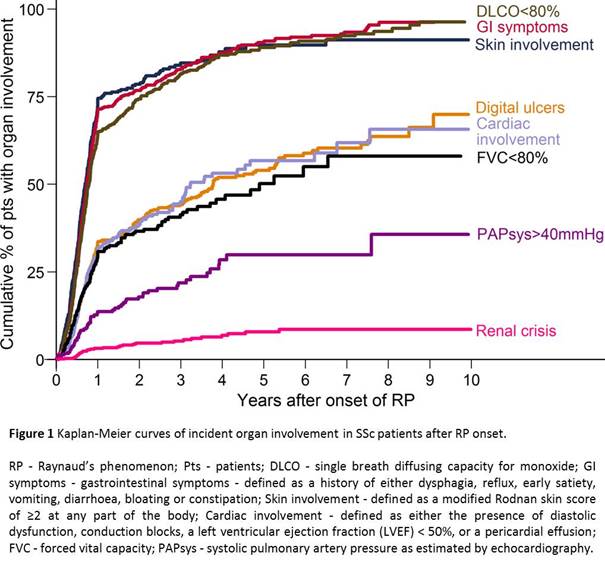Session Information
Date: Tuesday, November 10, 2015
Title: Systemic Sclerosis, Fibrosing Syndromes, and Raynaud's - Clinical Aspects and Therapeutics II
Session Type: ACR Concurrent Abstract Session
Session Time: 2:30PM-4:00PM
Background/Purpose:
Systemic sclerosis (SSc) is a rare and clinically heterogeneous
autoimmune disorder characterised by fibrosis and microvascular obliteration of
the skin and internal organs, particularly the heart, lungs, kidneys and the
digestive tract. Organ involvement mostly manifests after a variable period of
the onset of Raynaud’s phenomenon (RP). Using data from the large, multinational
EUSTAR cohort, we aimed to map the incidence and predictors of pulmonary,
cardiac, gastrointestinal (GI) and renal involvement in the early course of
SSc.
Methods:
Patients from the EUSTAR cohort with early SSc, defined as those who
had a visit within the first year of RP onset were studied. Outcome measures
were analysed as a function of time after RP onset using Kaplan-Meier methods,
and Cox regression analysis was used to evaluate predictors of incident organ
manifestations.
Results:
Of the 695 SSc patients in the EUSTAR database who had a baseline
visit within one year after RP onset, the incident non-RP manifestations (in
order of frequency) were: skin sclerosis (75%), GI symptoms (71%), impaired diffusing
capacity for carbon monoxide of <80% predicted (65%), digital ulcers (34%),
cardiac involvement (32%), impaired forced vital capacity (FVC) of <80%
predicted (31%), increased resting systolic pulmonary artery pressure estimated
by echocardiography (PAPsys)>40mmHg (14%), and renal crisis (3%; Figure 1).
Diffuse skin involvement was a significant predictor of incident FVC
impairment (Figure 2; Table 1), older age and male sex were predictors of
incident PAPsys>40mmHg (Figure 2; Table 1), and anti-topoisomerase
positivity and older age were predictors of incident cardiac manifestations
(Table 1). Incidence rates were highest for diastolic dysfunction, followed by
conduction blocks and pericardial effusion. Male sex, anti-RNA-polymerase-III
positivity and older age were predictors of renal crisis (Table 1).
Conclusion:
In SSc patients
presenting early after RP onset, approximately half of all incident organ
manifestations occur within 2 years. These findings may have implications for the design of new
diagnostic and therapeutic strategies aimed to ‘widen’ the still very narrow
‘window of opportunity’. They may also enable
physicians to counsel and manage patients presenting early in the course of SSc
more accurately.
To cite this abstract in AMA style:
Jaeger VK, Wirz EG, Allanore Y, Riemekasten G, Hachulla E, Distler O, Airo P, Carreira PE, Balbir-Gurman A, Tikly M, Vettori S, Damjanov N, Müller-Ladner U, Distler JH, Li M, Walker UA. Incidences and Predictors of Organ Manifestations in the Early Course of Systemic Sclerosis: A Longitudinal Study [abstract]. Arthritis Rheumatol. 2015; 67 (suppl 10). https://acrabstracts.org/abstract/incidences-and-predictors-of-organ-manifestations-in-the-early-course-of-systemic-sclerosis-a-longitudinal-study/. Accessed .« Back to 2015 ACR/ARHP Annual Meeting
ACR Meeting Abstracts - https://acrabstracts.org/abstract/incidences-and-predictors-of-organ-manifestations-in-the-early-course-of-systemic-sclerosis-a-longitudinal-study/



